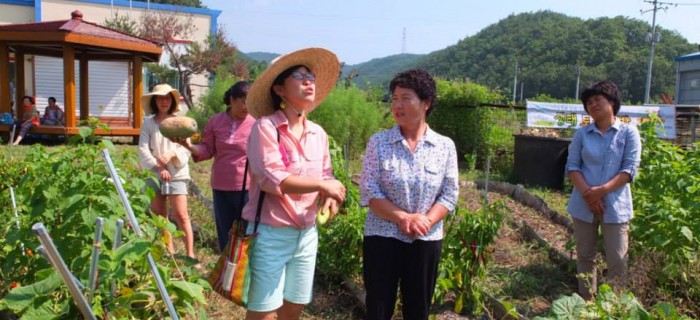New Food First Backgrounder Asks: Can “Alternative Tourism” Contribute to Food Sovereignty?
FOR IMMEDIATE RELEASE
Contact:
Katie Brimm Former Food Sovereignty Tours Program Coordinator Food First/Institute for Food and Development Policy 398 60th St. Oakland, CA 94618 Email: kbrimm@foodfirst.org Tel: (510) 654-4400, ext. 223New Food First Backgrounder Asks: Can “Alternative Tourism” Contribute to Food Sovereignty?
OAKLAND, Calif., August 2014 – In 2010, on the heels of a global food, financial and climate crisis, Food First launched Food Sovereignty Tours, an educational program focused on helping activists, researchers and concerned citizens to understand an increasingly complex global food system and engage in informed activism upon their return home, while also magnifying the voices of those struggling to carve out alternative, people-centered food systems around the world.
A new Backgrounder published by Food First/Institute for Food and Development Policy based in Oakland, CA, explores some of the main trends in “alternative tourism”—ecotourism, agritourism and justice tourism—in order to ask: Can educational, justice-focused travel truly be used as a tool to build social movements? And can it avoid reproducing the injustices generated by both conventional and alternative forms of tourism?
Drawing lessons from the benefits and pitfalls of ecotourism, agritourism and justice tourism, Food Sovereignty Tours works to emphasize and strengthen social movements as the main force for transformative change.
As the largest export earner in the world, tourism is undeniably “one of the most important forces shaping our world.” While it was used to promote workers’ right to leisure and “socialist education” among communist countries in the early 20th century, modern tourism has developed along capitalist lines, with benefits concentrated largely in the global North, perpetuating neocolonial forms of global inequality.
As a response to the many social and environmental criticisms of mass tourism, a number of “alternative” forms began emerging in the 1960s and 70s, such as pro-poor tourism, ecotourism, volunteer tourism, cultural tourism, sustainable tourism and community-based tourism. Nonetheless, many forms of alternative tourism fall short of advocating radical structural change—either within the tourism industry itself or in broader socio-economic systems.
Stay in the loop with Food First!
Get our independent analysis, research, and other publications you care about to your inbox for free!
Sign up today!Drawing lessons from the benefits and pitfalls of ecotourism, agritourism and justice tourism, Food Sovereignty Tours works to emphasize and strengthen social movements as the main force for transformative change. “While grappling with the injustices that have plagued tourism,” said Former Program Coordinator Katie Brimm, “we are constantly examining and evaluating our work, and we believe that tourism can indeed be used as a tool to strengthen movements for food sovereignty and food justice.”
This Food First Backgrounder (“Food Sovereignty Tours: Can Alternative Tourism Contribute to Food Sovereignty?”) can be downloaded for free by visiting: https://archive.foodfirst.org/publication/food-sovereignty-tours/
# # #


 Help Food First to continue growing an informed, transformative, and flourishing food movement.
Help Food First to continue growing an informed, transformative, and flourishing food movement.




